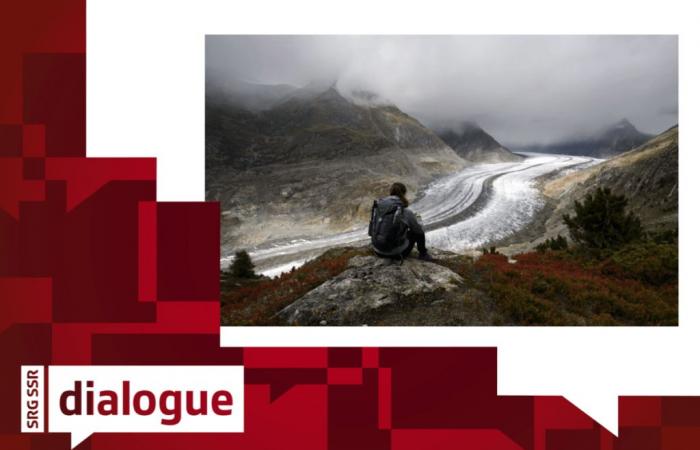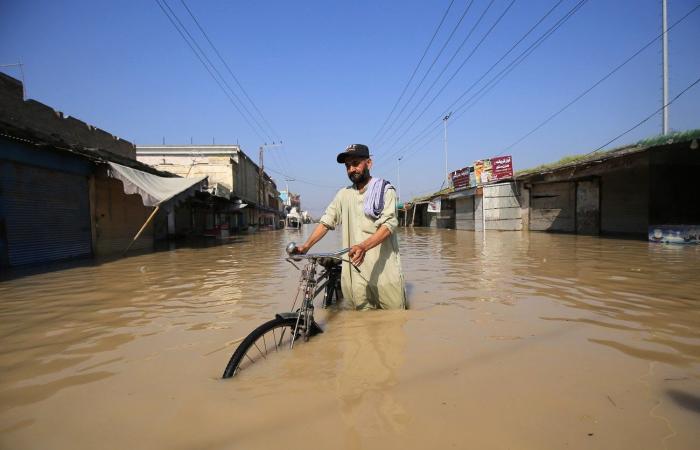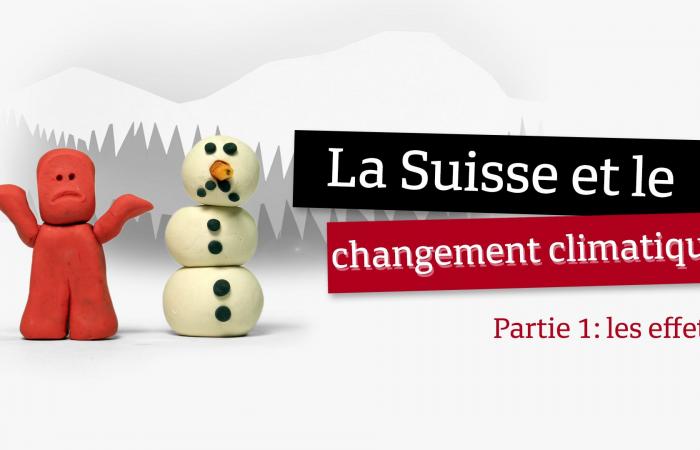The Aletsch glacier in Valais, Wednesday September 25, 2019. It is one of the largest rivers of ice in Europe (23 km in 2019, but more than 18.5 km in 2024), and the first site in the Alps listed as a UNESCO world heritage site. Global warming threatens its existence in the medium term, with its disappearance expected around 2100.
Keystone/Anthony Anex
Global warming retains a central position among the concerns of the Swiss population in 2024. According to an SSR survey, 67% of Swiss people are of the opinion that the global rise in temperatures is a serious problem and that we must intervene as quickly as possible. But nearly 70% are also pessimistic about the ability of politicians to take sufficient measures.
This content was published on
November 14, 2024 – 4.15pm
The Swiss population seriously doubts the capacity of its political class to respond to climate issues. This is shown by a comprehensive opinion survey carried out by the gfs.bern institute between the end of spring and the beginning of summer 2024, commissioned by the SSR.
Although the need to act is recognized as real and urgent by 67% of those surveyed, nearly 70% of respondents do not believe that the country’s politicians will be able to take sufficient measures to counter global warming of temperatures linked to emissions. greenhouse gas emissions.
This pessimism also translates into less conviction that companies and researchers will be able to develop new technologies in time to solve the problem. Only 37% believe it, or 6% less compared to the same question when it was asked in 2023.
An upward trend in distrust which could be explained by the general non-compliance with their climate commitments by Western states, including in particular Switzerland, condemned for climate inaction by the ECHR in the spring of 2024. A distrust which is also feel towards major climate COPs, such as the 29th edition currently being held in Baku, Azerbaijan.
Plus
Plus
COP29: Switzerland wants to include China and Russia among the countries paying for the climate crisis
This content was published on
11 nov. 2024
As the UN climate conference opens in Baku, Azerbaijan, Switzerland is proposing that developing countries that are large emitters of CO2 contribute to financing climate projects in poor countries.
read more COP29: Switzerland wants to include China and Russia among the countries paying for the climate crisis
A majority of Swiss say they take planes and cars less
Three quarters of the population believe that Switzerland is responsible for taking action, even if other countries do not participate in the collective effort. A majority focuses first on reducing emissions in Switzerland, not on supporting projects abroad (72%).
At the individual level, we observe dispositions to give up certain things, more marked for some, less for others. A majority of respondents already say they are reducing car journeys (51%), flying less (55%), buying less food from abroad (56%) and giving up setting their heating to more than 20 degrees (51%).
Just below average, 49% of respondents claim a conscious reduction in meat consumption. And we also find 43% of people who say they have already given up on a detached house, and 32% on a thermal car for climatic reasons.
Doubt, optimism and climate denialism
However, he stands out from clear minorities who do not fall into the category of people judging that global warming is a very real problem and that urgent action must be taken to reverse the trend.
Around 14% of respondents expressed doubt, asking for more research before taking action. 9% consider that humans will be able to adapt to the global rise in temperatures without any problem. Finally, 6% of those questioned think that global warming is not attributable to human activity, contrary to contemporary academic climatology.
The method
The results of the survey “How is Switzerland doing?” are based on a representative survey carried out among 51,182 inhabitants of Switzerland. It was carried out by the gfs.bern research institute in May and June 2024 on behalf of the SSR.
This is the second time this survey has been held. Compared to last year’s version, some questions were asked in new or different ways, but most are the same.
The sampling error is +/- 1.8% margin of error in a situation where 50% answer yes and 50% answer no, with 95% probability. So if a result shows that 50% of people support a given opinion, the result could actually vary between 48.2% and 51.8%.
Learn more
Following
Previous

Plus
The reality of climate change in Switzerland
This content was published on
05 nov. 2021
First of two videos on climate change, showing how it affects Switzerland’s landscape, economy and people.
read more The reality of climate change in Switzerland








